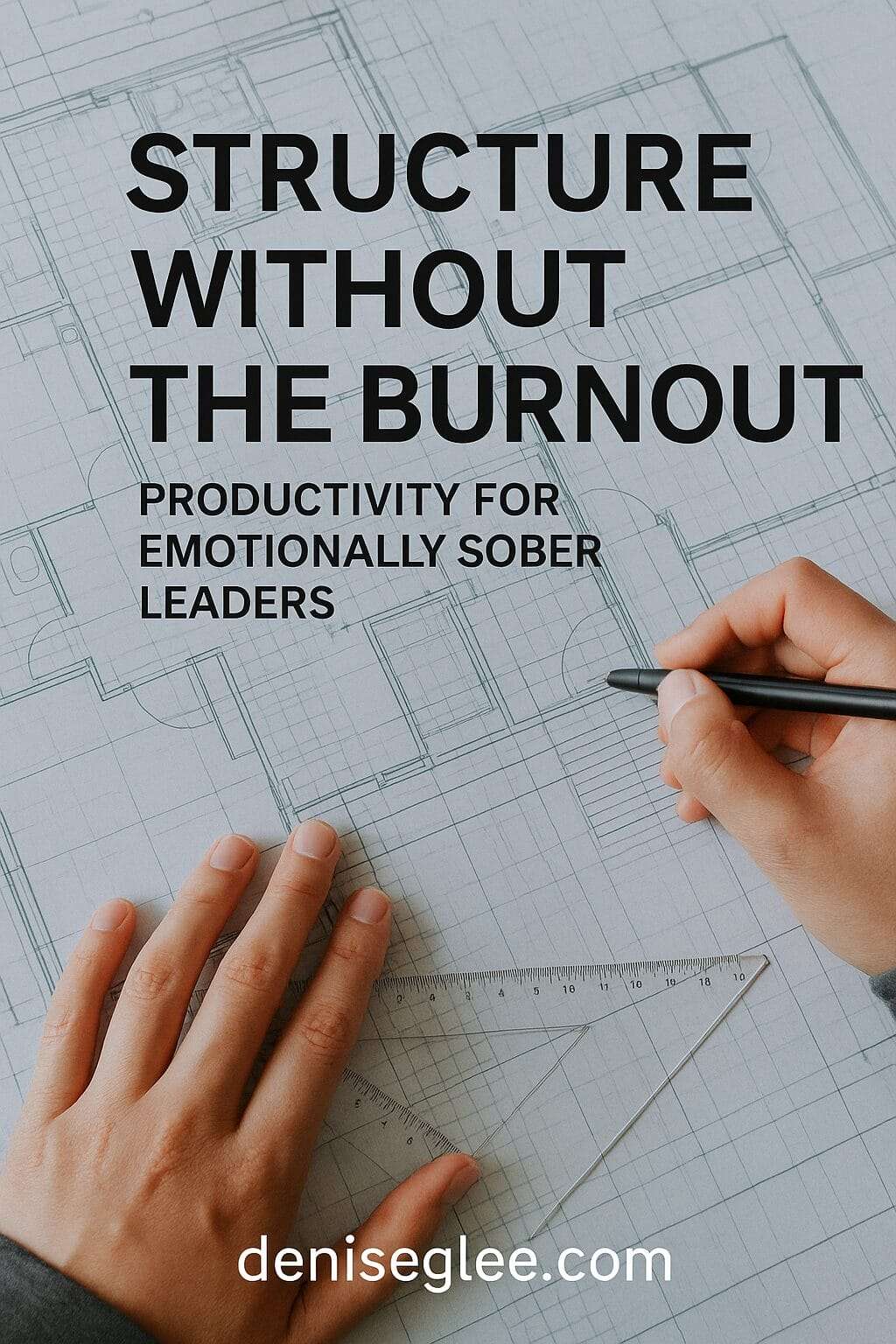- Updated:
- Updated: June 9, 2025
You’ve always been able to get things done—on adrenaline, on pressure, on last-minute pushes that left you wrung out but still praised. You’re high-functioning. Maybe even impressive on paper. But here’s the thing you don’t say out loud:
You’re tired.
Not just physically. Existentially. The way you’ve been operating doesn’t feel sustainable anymore. You can still perform—but you’re noticing the cost. The cracks are showing in your focus, your health, your patience. You’ve tried planners. Time-blocking. Maybe even shame disguised as “motivation.”
What you haven’t had is a system that honors both your ambition and your nervous system.
This isn’t about optimizing every minute. It’s about learning how to lead with clarity, not chaos. Let’s talk about real productivity—one that doesn’t burn you out, betray your healing, or require you to fake being fine.
This is for the emotionally sober leader who’s ready to build something that actually holds.
What We’ll Cover (For the Leader Who’s Ready to Stop Winging It)
Why You Still Need Accountability—Even When the Stakes Are High
Because accountability isn’t about weakness—it’s about biology, psychology, and the weight of being human.
Even in the face of something as life-threatening as cancer, people still need accountability. That alone should tell you something.

-
Survival Mode Isn’t the Same as Motivation
A client once told me, “I had a major health scare, and for a few weeks, I was on top of everything. Then it wore off.” A diagnosis can create urgency—but urgency fades. What sticks is rhythm. A coach or support structure helps turn panic into process.
📊 According to the American Society of Training and Development, people are 65% more likely to meet a goal after committing to another person—and 95% more likely when they build in ongoing accountability.
-
The Brain Doesn’t Magically Rewire for Discipline
Just because you know better doesn’t mean your prefrontal cortex suddenly performs better. Leaders still procrastinate on delegation, sit in performance reviews longer than needed, or drown in reactive tasks—unless a system interrupts the pattern. -
Isolation Doesn’t Just Happen in Illness
Plenty of leaders go home to partners who don’t understand their mental load, or teams that rely on them without giving back. That emotional solitude quietly erodes follow-through. Accountability reintroduces partnership. -
Emotional Exhaustion Is a Leadership Liability
One founder told me, “I’m not even burnt out—I’m just too numb to care.” When you’re emotionally depleted, effort feels foreign. A steady, non-reactive voice from the outside helps you reconnect to what matters—and move again. -
Consistency Requires Belief—and Belief Needs Reinforcement
If you’ve been doubting yourself or waiting for the perfect moment, consistency becomes a dream instead of a discipline. Accountability is the rhythm keeper. It’s how belief becomes embodied.
“Accountability isn’t a crutch. It’s a form of care.” — Unknown
Why You Resist Accountability—Even When You Say You Want It
Here’s the paradox: the more someone needs accountability, the more likely they are to resist it.

You don’t want someone in your business. You don’t want to feel like you’re failing. You definitely don’t want to admit that structure feels hard.
But what if your resistance isn’t rebellion—it’s protection? Here are some things to consider:
It Confronts Your False Sense of Control
You tell yourself you’re managing, but your inbox says otherwise. You’re the bottleneck on five projects. Your podcast hasn’t aired in a month. Accountability removes the fog and puts the mirror up.
It Feels Like Shame Dressed Up as Help
Especially for high-achievers who were raised in performance-driven households, being “checked on” can feel like being watched. That fear of judgment creates defensiveness, even when the feedback is kind.
It Threatens Your Identity
Many leaders cling to the idea that they’re self-starters. That they shouldn’t need support. But if being seen as strong is more important than being effective—you’ll stay stuck.
“We protect the patterns that kept us alive, even if they’re now keeping us small.” — Trauma therapist Resmaa Menakem
It Requires Vulnerability
Admitting you can’t hold it all alone? Risky. But leadership without vulnerability isn’t leadership—it’s performance.
It Activates Old Authority Wounds
You might not consciously remember it, but if accountability feels like micromanagement, something in your system is still bracing. That’s not weakness—it’s memory. The question is: do you want to live there?
It Disrupts Comfortable Patterns
You know your rituals. Avoid, overwork, ruminate, reset. Accountability says: Let’s not do that this time. That interruption can feel like threat—when it’s actually freedom.
It Destroys the Fantasy of Spontaneous Transformation
There’s no cosmic lightning bolt coming. Just small reps, sober consistency, and real-time course correction. Accountability replaces fantasy with follow-through.
In short? Accountability makes the internal visible. And if you haven’t built safety around being seen as you truly are, you’ll resist it—even when your future depends on it.
Six Reframes for Sustainable Leadership Structure
Let’s go deeper into what sustainable productivity actually looks like. These aren’t generic self-help mantras or corporate hacks—they’re grounded practices for emotionally sober leaders.
Each of these six shifts speaks to both your internal alignment and your external execution.
If you want clarity, consistency, and clean leadership energy, start here:

1. Maximize your morning routine →
Establish non-negotiables that sharpen your mental state before anyone else touches your energy.
No more waking up and letting Slack, email, or Instagram hijack your nervous system. Structure your start. Whether it’s stillness, journaling, planning, or movement—make it sacred.
2. Ask yourself, “Can I do better?” →
Audit your sabotage. Identify where you’re leaking time, avoiding structure, or hiding behind “busy.”
Look at your week honestly. Where are you drifting into fake urgency? Who are you rescuing instead of delegating? This isn’t about guilt—it’s about pattern recognition.
3. Organize your electronic/physical workspace →
Create a system that reflects the clarity you claim to want. Clutter is an integrity leak.
You don’t need a Pinterest office. But your environment trains your brain. If every corner screams “unfinished,” your body stays on edge. Give yourself the gift of calm order.
4. Identify your priorities →
Clarify what drives your business forward—and stop rearranging tasks to avoid discomfort.
You know what actually moves the needle. But are you doing it? Or are you tweaking spreadsheets and reformatting Canva posts because it feels safer than writing the hard email?
5. No unnecessary meetings →
Lead like your time matters. Every meeting trains people how to treat your attention.
If your team doesn’t know how to update you without a call, train them. If you don’t need to be there, say so. Stop building resentment by pretending your presence is required everywhere.
6. Eliminate negative thinking →
Stop indulging in spirals disguised as realism. Practice emotional discipline—then lead from it.
You don’t have to fake positivity. But you do have to interrupt the story that says everything’s doomed. Clarity and courage are built through conscious reframes—not default spirals.
💬 FAQ: Real Talk Before You Reach Out
Q: What if I’ve tried structure before and it didn’t stick?
A: Then you’ve probably tried someone else’s system—or used shame as a motivator.
What I teach isn’t about perfection or rigidity. It’s about building rhythm that respects your nervous system. If you’re finally ready to do it your way, we’ll make it sustainable.
Q: I feel like I should be able to do this on my own. Does needing accountability mean I’m weak?
A: No. It means you’re human—and likely carrying more than most. High-functioning people often hide their overwhelm under competence.
Accountability isn’t about babysitting. It’s about creating structure where your follow-through stops relying on adrenaline.
Q: How do I know if your coaching is the right fit?
A: If you’re done pretending, open to honest reflection, and ready to build something real—this is for you. I work best with leaders who are self-aware, emotionally sober (or willing to get there), and serious about making internal shifts that last.
Final Thoughts: Accountability ≠ Failure. It’s Self-Care in Action.
You don’t need another sprint. You need a system.
You don’t need a coach who cheers you on. You need one who holds you honest.
You don’t need more willpower. You need structure that works with your healing—not against it.
If you’re ready to stop flying by the seat of your pants—and start leading from a place of grounded clarity—I’d be honored to support you.
💛 Work with me, Denise G. Lee – Together, we’ll untangle the deeper patterns holding you back and create clear, practical strategies that match you. No hype. No formulas. Just honest, personalized support.
👉 Explore working together
🎙️ Want more real talk like this?
Listen to my podcast for unfiltered conversations on emotional growth, leadership, and the truth about healing in business and life.
👉 Introverted Entrepreneur – wherever you stream
💌 Got thoughts or questions about this article?
I’d love to hear from you.
👉 Write me a note
And just in case no one’s reminded you lately:
Leadership isn’t about being perfect.
It’s about being present. Being willing.
Showing up with your scars, not just your strengths.
That’s what makes it powerful.
That’s what makes it real.



